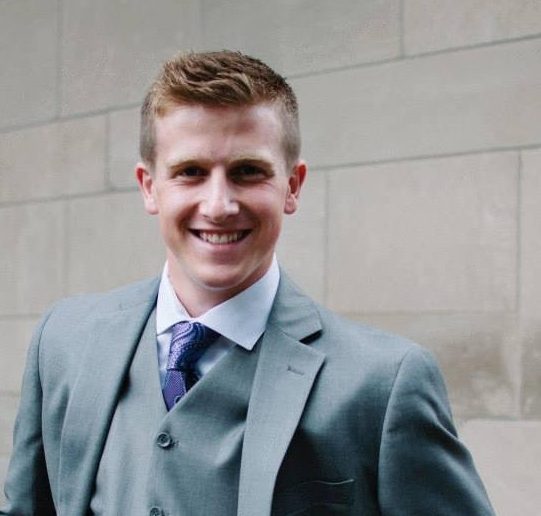 Joe Rodgers is a Corporate Account Executive at Sovos. He spoke with the Sales Health Alliance to share his story and best practices for managing Mental Health in sales.
Joe Rodgers is a Corporate Account Executive at Sovos. He spoke with the Sales Health Alliance to share his story and best practices for managing Mental Health in sales.
Sovos Compliance is the global leader in business-to-government reporting solutions and the #1 filer of 1099 forms. They help businesses prepare for the digital future of tax.
What is your role at Sovos Compliance?
As an Account Executive, I work directly with new and existing clients to help them uncover issues they face regarding 10-series reporting with the IRS.
By taking a consultative approach I’m able to earn my clients trust and prove I have a strong understanding of their needs at an individual and business level. I then prescribe the right solution to solve those problems.
The solutions I offer, help my clients become more efficient, mitigate risk, and become more scale-able. In many ways I’m improving their way of life.
Why do you think more awareness is needed around Mental Health as it relates to working in Sales?
Sales has many different connotations.
When people picture a salesperson they can visualize many things. A swindler peddling snake oil, a professional meeting with executives, and everything in between. At the end of the day, a salesperson is just that – a person.
They can do well when they put in the work and apply themselves, but sometimes even working hard doesn’t produce the revenue that their leadership demands. Salespeople are typically always fighting to keep their spot as they’ve seen peers terminated based on performance alone.
They step into their roles knowing there is only a small safety net, but if they work hard and get creative – success and money can be worth the risk.
This risk drives salespeople to invest time, energy, and emotion into each deal they work. They also work with people who have a fiduciary responsibility to their own company or self and may do outlandish things to protect that.
All of these things provide real stressors for every salesperson. If they are not processed and handled properly, those stressors can lead to dramatic declines in both mental and physical health.
What has been your experience with Mental Health throughout your Sales career?
As a young sales professional I still have a lot left to learn. In the early stages of my career I have already had many experiences that have shaped how I persevere through challenges.
Although often left off the table in the professional realm my faith has played a huge part in overcoming challenges and stress.
I have a commitment to work hard with each day I am given. When the day doesn’t go as planned I have a trust that is unbreakable. This trust affirms I will get through the current circumstances.
Learning From Others
The second piece to my mental health is allowing myself to learn and get better.
Allowing yourself to learn does not mean you should be the smartest person in the room or that you can’t be wrong. Instead, it means doing the opposite. Learning from the wisdom of others and the mistakes they have already made.
Odds are people around you have made mistakes or lost deals. They likely learned from those experiences, especially if they are still employed. It is ALWAYS easier to learn from the mistakes of others than making the same mistake yourself.
Being a bit stubborn and thick-skulled I often forget this and am forced to make the mistake myself. I often have to remind myself that the mistake is ok. It’s how you process that mistake that determines your ability to learn from it and grow.
Then, when you are presented with a similar circumstance in the future you already have the best strategy to avoid making the same mistake again.
The final most important way I deal with challenges is by leaving everything I have on the table for each deal. If I can confidently say that I did everything I could do and my deal still doesn’t get done I am just fine moving on from it.
Who have been your biggest workplace influences around positive Mental Health?
Internally – My manager, my VP, and my colleagues in general.
Externally – My beautiful wife (listed first for a reason), Gary Vaynerchuk, Tony Robbins, my best friend from college, and my network of small business owners.
During a typical day, week, month or quarter working Sales – What events impact your Mental Health the most at Sovos?
The end of any month, quarter, or year.
These are clearly stated deadlines in professional sales that really shed light on each deal you’ve been involved with. It’s often a time of high stress, but also an opportunity to test your deal and have visibility on the result.
What are some of your Best Practices for maintaining your Mental Health while working in Sales at Sovos?
Wake up early. 4 or 5 am. Review your day, create a plan, and execute that plan.
By waking up that early you not only leave room for the unexpected overnight email or issue but you also avoid the trap of distractions. I can’t recall the last time my phone rang between 4 and 6 am unexpectedly.
Don’t leave work until you feel good about what you got done. Set a goal in the morning, write it down, don’t leave until it’s done.
Eat the frog first. Do the thing that you least want to do before anything else. It won’t hang over you and you won’t be looking for ways to distract yourself.
Find and be accountable to a set of morals. For me it is my faith in Jesus Christ. I’m not saying this is for you but have something that is there as a constant. Be sure it makes you a better person.
Mindfulness meditation is very underrated. Take a moment to realize that life exists outside of work. Give emphasis to your existence and the value of each breath.
Take time for family. Spend time being present outside of work.
HAVE GOALS. Know your goals. Track your progress. Reward completion.
How do you talk about Mental Health at Sovos?
I think the sales resilience piece is the easiest for companies to talk about.
Obviously, any organization wants their reps to bounce back and continue to do well and be successful. My current employer does a good job asking important questions about what we learn each week and how we can do better in some areas.
Sovos also rewards those that do what they say they are going to do. They also encourage their reps to go out and do their best but understand making mistakes is valuable too.
What is the number one thing you would change about working in Sales that you think would improve Sales Rep Mental Health the most?
Setting aside time to discuss how you’re feeling mentally and normalizing the fact that deals take a toll on us sometimes. This would benefit everyone. By having that time set aside to reset and learn it encourages the development and confidence of the overall sales force.
What would be even more beneficial is doing this with a more “tenured” or “weathered” rep. Someone who remembers a time similar or can relate somehow to the circumstance you’re going through.
At the end of the day if you look at a lot of these practices they coincide with practices that successful reps have been using for years. It demands our thought that mental health may be directly correlated to our success in the industry.
The Sales Health Alliance would like to thank Joe for sharing his best practices and you can view his LinkedIn profile by clicking the link.
More than 2 in 5 salespeople struggle with their Mental Health. For more best practices to help you improve your sales performance through better Mental Health – check out the course below.
Online Course: Improve Sales Performance Through Better Mental Health
About The Author

Jeff Riseley is currently the Founder of the Sales Health Alliance and Mental Health Advocate. With over a decade of sales experience – Jeff understands the importance of Mental Health in achieving peak sales performance.
Jeff combines his sales (Sales Knowledge Institute) and Mental Health expertise to improve sales performance through a mix of sales mentorship and mental health best practices. His strategies have helped sales teams improve their sales process, while helping them become more motivated, resilient and better equipped to tackle stressful events within sales.
He is currently delivering these strategies through on-site workshops, coaching and speaking engagements. To explore working with Jeff contact him at [email protected]




